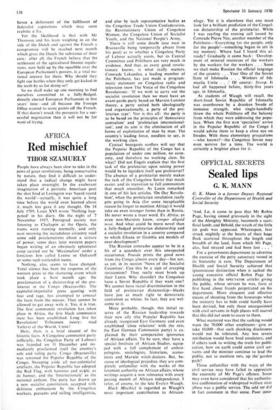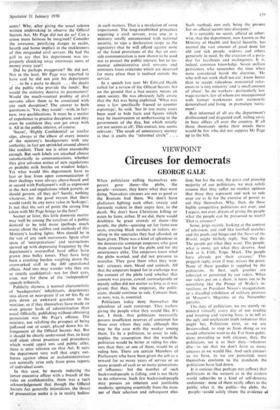OFFICIAL SECRETS
Sealed lips
G. K. MANN
G. K. Mann is a former Deputy Regional Controller of the Department of Health and Social Security
'And, Lo, it came to pass that Mr Robin Page, having sinned grievously in the sight of the Almighty Ministry, becometh a sacri- ficial lamb; and Behold, the wrath of the little tin gods was appeased. Whereupon, fear struck mightily at the hearts of their huge flock scattered throughout the length and breadth of the land, from which Mr Page, alas, had strayed and had been lost . . . '
For a government department to advertise the exercise of the petty autocracy vested in its hierarchy is rare. The Department of Health and Social Security achieved that ignominious distinction when it sacked the young executive official Robin Page for publishing in the SPECTATOR articles giving the public, whose servant he was, facts at first hand about frauds perpetrated on his department. More eloquent and effective means of shouting from the housetops what the ministry has to hide could hardly have been devised, but only those unacquainted with civil servants in high places will marvel that this did not seem to occur to them.
What mattered was that the sacking would warn the 70,000 other employees—give or take 10,000—that such shocking disclosures would not be tolerated. Any less severe retribution would have bred emulators; and if others took to writing the truth for publi- cation, how on earth could senior civil ser- vants and the minister continue to lead the public, not to mention MPS, up the garden path?
Those unfamiliar with the ways of the civil service may have failed to appreciate the enormity of Mr Page's offence. Some may even have considered that his authorita- tive confirmation of widespread welfare state abuse was a public service. The odd MP cl:d in fact comment in that sense. Poor inno-
cents! Why, after giving the usual solemn written undertaking to observe the Official Secrets Act, Mr Page did not do so! Can a crime more heinous be imagined? Consider the awesome, petrifying danger to realm, hearth and home implicit in the recklessness of this misguided civil servant. He had the gall to say that his department was im- properly chucking away enormous sums of money every year!
Did he perhaps exaggerate? He did not. Not in the least. Mr Page was reported to have said he did not join his department . . . to be a party to deceit . . . the deceit of the public who provide the funds'. But would the ministry deceive its paymasters? Would the much-vaunted probity of civil servants allow them to be associated with any such deception? The answer to both questions is, 'Yes, they would'—with, in fair- ness, two qualifications. It must be a matter of expedience to practise deception; and they must be confident they can get away with it. All in the public interest, of course.
'Secret', 'Highly Confidential' or similar slips, always at the elbow of every inmate of the ministry's headquarters with any authority, in fact are sprinkled around almost like confetti. Their use is often reasonable enough. But such labels are attached almost automatically to communications, whether they give advance notice of new regulations or prohibit milk bottles on window ledges.
Yet what would this department have to fear or lose from open communication if their dealings were always above-board and in accord with Parliament's will as expressed in the Acts and regulations which govern, or should govern, all they do? Surely, nothing whatever, for the good reason that there would rarely be any news value in 'leakages'. Is not that the sort of point the strong line taken with Mr Page brings to the fore?
Sooner or later, this little domestic matter may well be among the catalysts of a public demand to be told more (perhaps much
more) about the calibre and methods of this Ministry's leading lights. MPS should be in
the van of any such movement. Spate after spate of 'interpretations' and instructions spewed up with depressing frequency by the department's overstaffed head office have grown into bulky tomes. They have long been a crushing burden weighing down the
overworked staff in the 400 operational offices. And MPS may wonder why they are so strictly confidential—not for their eyes, even, nor for those of the 'independent' appeals tribunals.
Publicity shyness, a normal characteristic of 'headquarters' inhabitants, degenerates into alarm or near-panic if an MP lets fly or puts down an awkward question to the minister, or if they themielves have made an even greater hash of administration than usual. Officially, publishing without obtaining permission was Mr Page's offence. The ministry, not relishing the prospect of being guffawed out of court, played down his in- fringement of the Official Secrets Act. But it should be clearly understood that, to keep
staff silent about practices and procedures which would appal MPS and public alike,
there is utter reliance on that Act. It suits the department very well that angry out- bursts against abuse or maladministration can normally arise only from press reports of individual cases.
In this case, by merely indicting the junior executive officer with a breach of the rules on confidentiality, there was a tacit acknowledgement that though the Official Secrets Act generally intimidates, the threat of prosecution under it is in reality hollow in such matters. That is a revelation of some importance. The long-established procedure requiring a civil servant, even one in a ministry totally unconcerned with national security, to sign a declaration (copy to the signatory) that he will offend against none of the listed provisions of the Act on out- side communication is now shown to be used not to protect the public interest, but to im- munise administrative civil servants and ministers from criticisms which are deserved far more often than is realised outside the service.
In a speech last year Mr Edward Heath called for a review of the Official Secrets Act on the ground that a free society means an open society. He was obviously fully aware that the Act was being exploited. 'What was once a law specifically framed to counter espionage', he said, `has in too many cases been used to hide facts and figures which may be inconvenient or embarrassing to the government of the day, but which strictly are not secrets at all'. This extract, too, seems relevant: 'The result of unnecessary secrecy is that it exalts the "informal circle" . . . Such methods can only bring the present ,law on official secrets into disrepute.'
It is certainly no secret, official or other- wise, that the department, now known as the Ministry of Health and Social Security, has marred the vast amount of good done for old and sick people, widows and others genuinely in need, by the creation of a para- dise for layabouts and malingerers. It is, indeed, common knowledge. Seven million pensioners who remember the time when none considered harsh the doctrine, 'He who will not work shall not eat', know better than to accept ridiculous ministerial refer- ences to 'a tiny minority' and 'a small amount of abuse'. So do workers—particularly low wage-earners, few of whom are unacquainted with former workmates now statutorily demoralised and living in premature 'retire- ment'.
Best informed of all are the department's disillusioned and disgusted staff, toiling away in busy offices all over the country. If all those thousands spoke their minds there would be few who did not support Mr Page up to the hilt.



































 Previous page
Previous page